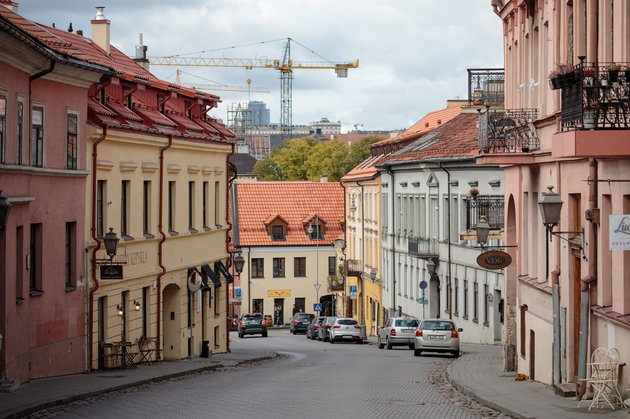
Frauke Scholz via Getty Images
Situated within the Lithuanian capital of Vilnius, Užupis is one of the world's smallest republics, covering less than one sq km. Don't be fooled by its size, however, as it boasts its own government, president, constitution and currency, and it has even a navy consisting of three or four small boats (used mainly for ceremonial purposes). It also had an army of around ten men until recently, but given the republic’s peace-loving attitude, it's been retired.
Užupis combines Soviet Bloc architecture and artistic flair. After the fall of the USSR in the early 90s, several plinths which had held statues of Soviet icons were standing empty across Vilnius. In 1995, a team of local artists used one of them to erect a statue of American rock icon Frank Zappa (although he had never been there) as a call to democracy and a symbol of freedom. On 1 April 1997, they decided to go one step further, declaring their neighborhood of Užupis independent from the rest of Lithuania. Even though foreign governments do not recognize Užupis as an official nation, the micro-nation has now become a source of pride in Vilnius and throughout the country.
Užupis, meaning ‘beyond the river’ in Lithuanian, is divided from the rest of the city by the Vilnele River. It celebrates its independence annually on 1 April, known locally as Užupis Day. On this day, travelers can get their passports stamped while they cross the bridge into the republic, use the local currency and treat themselves to the beer which flows from the main square's water spout.
What essentially started as a tongue-in-cheek April Fools’ Day joke for a small group of creatives ended up being a serious endeavor. The Republic of Užupis now has a constitution which has been translated into various languages.
The republic’s flag sports what is known as the ‘Holy Hand’: it's a blue hand with a hole in the middle, which is what makes it unable to accept bribes.
During the mid-20th Century when the region used to be under Soviet rule, the district was derelict; a dangerous part of the town for the brave or the foolish. One among the neighborhood’s primary thoroughfares, Užupis Street, was once nicknamed ‘the Street of Death,’ not only due to the high crime rate but also in recognition of the neighborhood’s Jewish population, that was decimated during the Holocaust. Today, though, the winding cobbled streets feature eccentric art installations as well as a renewed sense of life.
With the Republic's secured independence in 1997, a constitution soon followed. Užupis’ Foreign Minister Tomas Čepaitis and Užupis President Romas Lileikis penned the creed in only three hours one summer afternoon in 1998.
As with most things in Užupis, its government structure is a somewhat relaxed affair, as their parliament house also functions as the local cafe-cum-pub. A group of approximately a dozen ministers oversees the running of the micro-nation. However, for those who want to get involved in Užupis’ politics, being an active member of the local community is vital.
As unusual as it sounds, it's a system that works and has done for the past 21 years. Its president has held his position for that entire time, as have many of his ministers. The group meets most Mondays. Together they make political waves, working to build ties with other countries, albeit unofficially.

Birute via Getty Images

Nicole Silvestri via Getty Images

AFP Relax

Petras Malukas via Getty Images
According to BBC, Užupis' Republic has had piqued tourists’ interest since its inception back in 1997. The unintended consequence is that it has experienced some gentrification and development, which has prompted a spike in property prices.














This Is The Smallest Republic In The World, With An Army Of Ten People And Inspiration From Greek Philosopher Aristotle
ReplyDelete